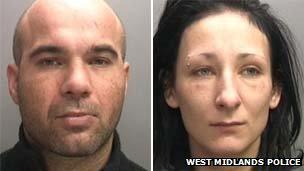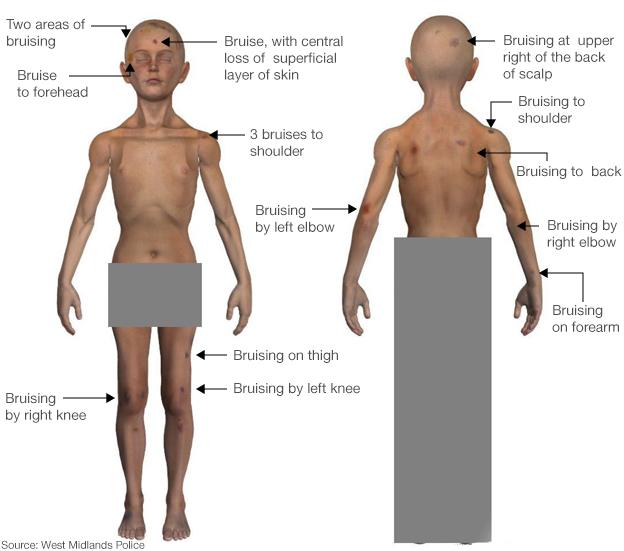Pelka abuse case could prompt law change, Clegg says
- Published
The BBC's Alison Holt explains the report's findings
A law making it mandatory for people working with children to report suspected abuse has not been ruled out to prevent deaths like that of Daniel Pelka, Nick Clegg has said.
The deputy prime minister said a law was "not necessarily" the solution, but would be considered if that was the "only way" to stop such tragedies.
He warned without co-operation children could still "fall between the cracks".
The children's minister said compulsory reporting would not have saved Daniel.
Four-year-old Daniel was starved and beaten for months before he died in March 2012 at his Coventry home.
A report published earlier, following a serious case review, found "no professional tried sufficiently hard" to talk to him.
Mr Clegg said his "sense" was that the real issue was a lack of communication between teachers, social workers and local authorities.
"The problem in this and unfortunately in other previous tragic cases is that individuals can fall between the cracks," he said.
Speaking about the possibility of changing the law, he added: "If it's the only way we can prevent this tragedy of this poor boy happening to other children then of course we will consider it."
'Bag of bones'
Children's Minister Edward Timpson said mandatory reporting - making it a criminal offence not to report suspected abuse - "wouldn't have helped Daniel".
He added: "We know from those countries that do have mandatory reporting it doesn't necessarily make children safer, and it can actually make them less safe - we know they have higher death rates of children, for example."
Home Secretary Theresa May said lessons must be learned from Daniel's death, particularly about sharing of information.
She said another lesson to be learned was that authorities investigating domestic violence should routinely "look at how those incidents affect children".

Police were called to several domestic incidents involving Mariusz Krezolek and Magdelena Luczak
At the trial of Daniel's mother Magdelena Luczak, 27, and her partner Mariusz Krezolek, 34, Birmingham Crown Court was told Daniel was a "bag of bones" and was "wasting away".
The court heard Daniel saw a doctor in hospital for a broken arm, arrived at school with bruises and facial injuries, and was seen scavenging for food.
Both defendants were convicted of murder, jailed for life and ordered to serve at least 30 years each.
Much of the detail that emerged in the trial about the abuse Daniel suffered was "completely unknown" to the professionals involved, the serious case review found.
'Too optimistic'
But it said Daniel could have been offered greater protection if they had applied a "much more enquiring mind".
No-one has been disciplined as a direct result of Daniel's death.
The report by Ron Lock did not blame or identify any individual agency but he said the professionals involved were "too optimistic" about what they saw.
"Workload was a potential issue - child protection is a very complex matter - and perhaps when they felt reassured they moved on to the next case," Mr Lock told BBC News.
"But they need to be stronger and have a much more inquiring mind. They needed to act on what was in front of them."
The review's key findings include:
Police were called to 26 separate incidents at the family home, many involving domestic violence and alcohol abuse
Excuses made by Daniel's "controlling" mother were accepted by agencies
Professionals needed to "think the unthinkable" and act upon what they saw, rather than accept "parental versions"
Daniel's "voice was not heard" because English was not his first language and he lacked confidence
No record of "any conversation" held with Daniel about his home life, his experiences outside school, or of his relationships with his siblings, mother and her partners
None of the agencies involved could have predicted Daniel's death
There were "committed attempts" by his school and health workers to address his "health and behavioural issues" in the months before his death
But "too many opportunities were missed for more urgent and purposeful interventions"
Two of those chances were when Daniel was taken to an accident and emergency department with injuries
In January 2011, when Daniel was three-and-a-half, he was taken to A&E with a fractured arm.
The review said the hospital "rightly raised immediate concerns about the [fractured arm]" and a meeting was held to decide if it was caused by a fall from a settee, as Daniel's mother claimed, or was the result of abuse.
The meeting decided Luczak's explanation was "plausible".
But the review said the reasons for other bruises found on Daniel at the time, which his mother claimed came from bicycle accidents, were not "fully explored".
'Invisible' Daniel
Amy Weir, chair of the Coventry Safeguarding Children Board, said she found the report "disheartening, disappointing and generally worrying".
Ms Weir said the idea of Daniel being "invisible" was "at the heart of this case".
Assistant Chief Constable Garry Forsyth, of West Midlands Police, said: "We accept that Daniel was not 'given a voice'."
He said the report "raised the lack of consistency" in officers dealing with separate domestic abuse reports and the force needed "a more holistic approach".
The report said such inconsistency had meant Daniel's lack of language and low confidence were not picked up, making it "almost impossible for him to reveal the abuse he was suffering".
"Overall, the 'rule of optimism' appeared to have prevailed," it said.
It also said school staff did not link Daniel's physical injuries with their concerns about his apparent obsession with food, which his mother claimed was caused by a medical condition.
Gill Mulhall, Daniel's head teacher at Little Heath Primary in Coventry, said: "His mother was a convincing manipulator.
"If we were aware of the bigger picture of his life or had doubts about her, we would of course have acted differently."

Geoffrey Robinson, MP for Coventry North West, described Daniel Pelka's death as "a great disgrace" for the city and called on the council's chief executive, Martin Reeves, to consider his position.
Mr Reeves said the city had "never faced such a tragic case" and staff needed to "learn quickly" from the review.
"The best legacy for Daniel is to make sure we move forward and I want to have a part to play in that future," he said.
"This can't be about a witch hunt or vilification of professionals."
- Published17 September 2013
- Published17 September 2013
- Published17 September 2013
- Published17 September 2013
- Published17 September 2013
- Published17 September 2013
- Published17 September 2013
- Published16 September 2013
- Published12 September 2013
- Published2 August 2013
- Published17 September 2013
 NHS boss defends doctor
NHS boss defends doctor
 Coventry Safeguarding board
Coventry Safeguarding board
 Headteacher's statement
Headteacher's statement
 Police admit 'missed opportunities'
Police admit 'missed opportunities'
 Report author lists failings
Report author lists failings